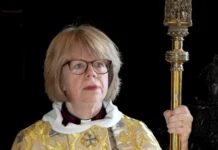Women and the Church (WATCH), a national campaign group for gender equality in the Church of England, notes the nomination of The Right Reverend Philip North, Suffragan Bishop of Burnley, as the next diocesan Bishop of Blackburn.
We recognise Bishop Philip’s many gifts and are aware that he has been supportive of women in a range of ministerial posts in the Church, some at senior levels.
Nonetheless, Bishop Philip does not recognise the ordination of women as priests and bishops and will be the first diocesan bishop to be appointed with his theological position on the ordination of women since women were permitted to be bishops in 2014.
In that light, WATCH cannot support the nomination and has the following concerns:
- A diocesan bishop oversees all clergy in their diocese, both women and men and so, appointing a diocesan bishop who does not personally recognise the ordination of women, could mean that some female clergy would struggle to flourish under his oversight. Unlike male clergy who do not fully accept women’s ministry, female clergy (and their parishes) do not have the right to extended episcopal oversight by a bishop who affirms their ministries – both in their authority and ability to carry out priestly roles.
- There are non-ordaining bishops who are supportive of women in the Church, as is Bishop Philip, and have encouraged them in their ministries and recommended them to senior roles but, because these bishops do not fully recognise the priesthood of their female clergy, they do not ordain women in their diocese.
- Questions arise as to how non-ordaining bishops can authorise female clergy to celebrate the Eucharist, baptise, give blessings and absolve people of their sins. When a priest is licensed to a parish role, such as vicar, the diocesan bishop shares with him or her ‘the cure of souls’ to do these things, and usually does this in a public service so that all the parishioners can hear and see this authority being shared with their new vicar. Parishioners need to know that their priest is affirmed by their diocesan bishop as being able to carry out priestly duties without question, and all priests need to know this too. When parishioners come to understand that their bishop is not personally confident that female priests can undertake priestly roles, such as consecrating the bread and wine, this undermines the authority of their vicar, if she is a woman.
- Church of England ministry statistics indicate that dioceses with diocesan bishops who do not accept the ordination of women, or which have a history of senior leaders who do not fully accept women’s ministry, have a significantly lower percentage of women holding stipendiary posts than men. At the bottom of the table is the Diocese of Chichester, which has always had a bishop who does not ordain women, with the lowest at 16%, compared to Ely at the top of the table with 43%.[1] The reasons for women’s ministry continuing not to flourish in many dioceses need urgently to be analysed, understood and responded to by Ministry Divisions in the Church of England.
- Bishop Philip is a member of and on the Council of The Society of St Wilfrid and St Hilda (SSWSH), which is a network of clergy who do not share in the Eucharist when it is presided over by any female priest, any male priest ordained by a female bishop, and by any bishop, male or female, who has ordained women. Appointing a diocesan bishop who does not share in the Eucharist with the whole of the House of Bishops is a challenge to the unity of that body and the Church’s teaching on this matter.
Rev Martine Oborne, Chair of WATCH, says ‘I personally struggled when my diocesan bishop was the Right Reverend and Right Honourable Richard Chartres KCVO. I was ordained by him as a deacon in St Paul’s Cathedral in 2009, but he did not go on to ordain me or any other deacon, male or female, the following year. This was a position he had adopted since it became possible for women to be priests some fifteen years earlier. Instead, he delegated priestings to his Area Bishops. In the case of my priesting, my Area Bishop was on compassionate leave in 2010 and so I wrote to Bishop Richard and asked if would make an exception to his rule and ordain me and the rest of the orphaned ‘Stepney Seven’ of male and female deacons who were due to be priested. He refused, and I was ordained by the Bishop of Sodor and Man, a delightful man, but someone I’d never met before or since.
Fortunately today, both my diocesan and Area bishops recognise my orders, but I don’t think I could personally flourish in my ministry if they did not. Even in my present situation, I find it undermining to explain to members of my congregation that some of my clergy colleagues, including bishops, would not receive bread and wine that I had consecrated. So I tend not to say anything about the situation. Nonetheless, this is a heavy burden to carry and makes me feel that I am a second-class priest. And I fear some female clergy with diocesan bishops who don’t recognise their ordinations, no matter how supportive they are, may feel this even more.’
Other notes on Bishop Philip North
- North is a member of the Council of Bishops of The Society of St Wilfrid and St Hilda. The Society was created in 2010 by a group of bishops of the Church of England who do not ordain women to the priesthood. One of the stated main purposes of The Society is to guarantee a ministry in the historic apostolic succession in which our people can have confidence – in other words, to offer ‘sacramental assurance.’ Only male priests and, among them, only those who have not been ordained by a women can provide such ‘sacramental assurance.’ This means that The Society does not recognise that bread and wine consecrated by female clergy have that sacramental assurance.
- He is a priest administrator of the Anglican Shrine of Our Lady of Walsingham, a national shrine which does not permit female clergy to preside over communion there.
- He was consecrated at York Minster on 2 February 2015. The laying on of hands was restricted to three bishops “who share his theological conviction regarding the ordination of women”; the other bishops at the service, including the only woman then consecrated as a bishop, Libby Lane, and John Sentamu, Archbishop of York, gathered around him during the consecration prayer instead.
[1] https://womenandthechurch.org/resources/a-report-on-the-developments-in-womens-ministry-in-2021/




… [Trackback]
[…] There you will find 32586 more Infos: anglican.ink/2023/01/13/objections-to-the-appointment-of-philip-north-raised-by-watch/ […]